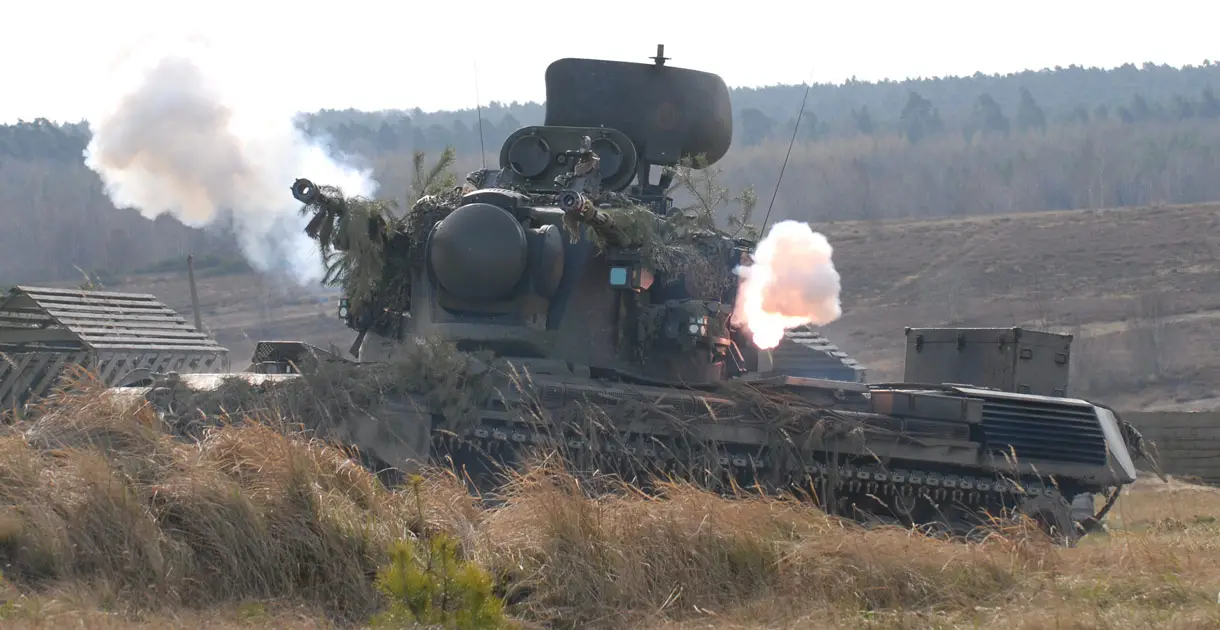Ukraine Weapons Tracker has released a video of a Flakpanzer Gepard Self Propelled Anti-aircraft Gun (SPAAG) shooting down a Russian cruise missile close to Ukrainian infrastructure targets. Reports claim that is the first ever recorded shooting down of a cruise missile with the Gepard SPAAG, a weapon designed to provide close-in air defense against low-flying projeciles such as UAVs, helicopters and short range missiles. The Gepard has been deployed by Ukraine in its defense against the 2022 Russian invasion of Ukraine. The first three Gepards arrived in Ukraine on 25th July 2022. By 20 September 2022 thirty Gepards and 6,000 rounds had been delivered. According to Ukraine’s Armed Forces about 50,000 Norwegian made rounds for the Gepard had been received by 26 September 2022.
According to a Ukrainian defense attache in the United States the Gepard has been used to “great effect” against the “relatively crude” loitering munition believed to be Iranian-made Shahed-136. The Conflict Intelligence Team considers it likely that a Gepard destroyed a Russian Kh-101 cruise missile as it was targeting a Kyiv power plant on 18 October 2022. One unit is credited with destroying more than ten Shahed-136 drones and two cruise missiles. Such systems are more effective and hence more cost-effective than more advanced and expensive air defence systems such NASAMS or IRIS-T missiles, while being less politically sensitive as they only have a limited effective range. On 2 December, Germany recovered seven additional Gepard tanks from the “scrap pile” to be refurbished and sent to Ukraine. Bringing the total units sent to Ukraine at 30. They will arrive in spring 2023.

The Flugabwehrkanonenpanzer Gepard (“anti-aircraft-gun tank ‘Cheetah’”, better known as the Flakpanzer Gepard) is an all-weather-capable German self-propelled anti-aircraft gun (SPAAG). The vehicle is based on the hull of the Leopard 1 tank with a large fully rotating turret carrying the armament—a pair of 35 mm Oerlikon KDA autocannons. It was developed in the 1960s, fielded in the 1970s, and has been upgraded several times with the latest electronics. It has been a cornerstone of the air defence of the German Army (Bundeswehr) and a number of other NATO countries. In Germany, the Gepard was phased out in late 2010 and replaced by the Wiesel 2 Ozelot Leichtes Flugabwehrsystem (LeFlaSys) with four FIM-92 Stinger or LFK NG missile launchers. A variant with the MANTIS gun system and LFK NG missiles, based on the GTK Boxer, was also considered.
The electrically driven turret is powered by a 40 kW generator driven by a 4-cylinder, 3.8 litre Mercedes-Benz OM 314 multi-fuel engine that is placed in the front of the hull to the left of the driver. The guns are 90 calibres (3.15 m (10 ft 4 in)) long, with a muzzle velocity of 1,440 m/s (4,700 ft/s) (FAPDS—Frangible Armour Piercing Discarding Sabot rounds), giving an effective range of 5.5 km (3.4 mi). The KDA autocannon has a dual belt feed for two different ammunition types; the usual loading per gun is 320 AA rounds fed from inside the turret and 20 AP rounds fed from a small outlying storage. Each gun has a firing rate of 550 rounds/min. The 40 armour-piercing rounds are normally fired singly with the guns alternating; they are intended for self defence against armoured ground targets. It is standard to fire bursts against air targets, 24 rounds per gun for a total of 48 in limited mode and 48 rounds per gun for a total of 96 in normal mode.















